Intro
Discover what an anal fissure is, its causes, symptoms, and treatments. Learn about painful tears, rectal bleeding, and anal spasms, and find relief from this common anorectal condition.
An anal fissure is a small tear in the lining of the anus, which can cause severe pain and bleeding during and after bowel movements. This condition is quite common and can affect anyone, regardless of age or gender. The pain caused by an anal fissure can be so intense that it may lead to avoidance of bowel movements, which can further exacerbate the condition. Understanding the causes, symptoms, and treatment options for anal fissures is essential for effective management and prevention of this condition.
The anus is a sensitive area, and any tear or cut in the lining can be extremely painful. An anal fissure can be compared to a paper cut, but instead of being on the skin, it is inside the anus. The tear can be shallow or deep, and it may extend to the surrounding muscles. The symptoms of an anal fissure can vary from person to person, but the most common symptoms include severe pain during and after bowel movements, bleeding, and swelling in the anal area. In some cases, an anal fissure can also cause itching, discharge, and difficulty passing stools.
An anal fissure can be caused by a variety of factors, including constipation, diarrhea, anal sex, and childbirth. Constipation is one of the most common causes of anal fissures, as it can cause the stool to be hard and dry, leading to straining during bowel movements. This straining can cause the anal lining to tear, resulting in a fissure. Diarrhea can also cause an anal fissure, as the frequent passage of stool can irritate the anal lining and cause it to tear. Other factors, such as poor diet, lack of fiber, and certain medical conditions, can also contribute to the development of an anal fissure.
Causes Of Anal Fissures
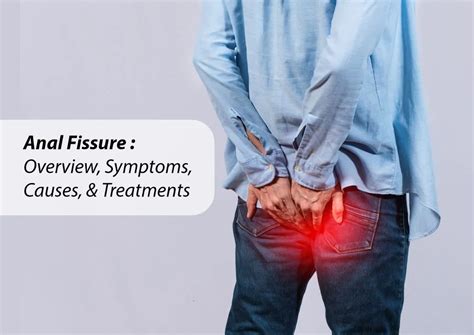
Some of the primary causes of anal fissures include:
- Constipation: Hard and dry stool can cause straining during bowel movements, leading to a tear in the anal lining.
- Diarrhea: Frequent passage of stool can irritate the anal lining and cause it to tear.
- Anal sex: Trauma to the anal lining during anal sex can cause a fissure.
- Childbirth: The anal lining can tear during childbirth, leading to a fissure. Other factors, such as poor diet, lack of fiber, and certain medical conditions, can also contribute to the development of an anal fissure.
Symptoms Of Anal Fissures
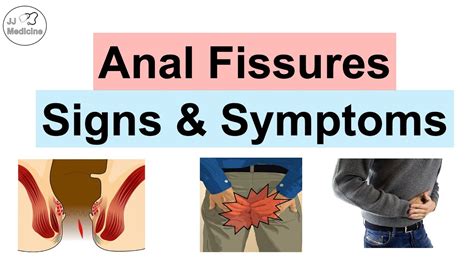
Treatment Options For Anal Fissures
The treatment options for anal fissures depend on the severity of the condition. Mild cases of anal fissures can be treated with home remedies, such as increasing fiber intake, drinking plenty of water, and avoiding straining during bowel movements. More severe cases may require medical treatment, such as topical creams, prescription medications, or surgery.Some of the treatment options for anal fissures include:
- Topical creams: Creams containing nitroglycerin or calcium channel blockers can help to relax the anal muscles and increase blood flow to the area.
- Prescription medications: Medications such as pain relievers, muscle relaxants, and stool softeners can help to manage the symptoms of an anal fissure.
- Surgery: In severe cases, surgery may be necessary to repair the fissure.
Prevention Of Anal Fissures
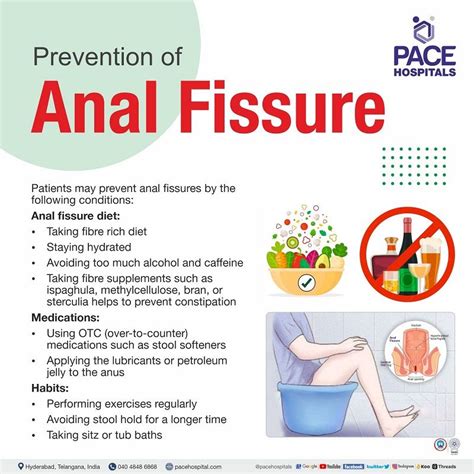
Complications Of Anal Fissures
If left untreated, anal fissures can lead to complications, such as: * Chronic pain * Infection * Abscess * Fistula * Anal stenosis It is essential to seek medical attention if symptoms persist or worsen over time.Diet And Nutrition For Anal Fissures

Lifestyle Changes For Anal Fissures
Lifestyle changes can also help to prevent and manage anal fissures. Some of the lifestyle changes include: * Avoiding smoking * Avoiding excessive alcohol consumption * Practicing good anal hygiene * Avoiding tight clothing * Avoiding straining during bowel movementsAlternative Therapies For Anal Fissures
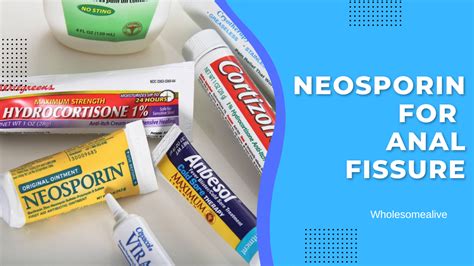
Some of the alternative therapies for anal fissures include:
- Acupuncture: This involves inserting thin needles into specific points on the body to stimulate healing and relaxation.
- Herbal supplements: Herbal supplements, such as aloe vera and witch hazel, can help to soothe and calm the anal area.
- Homeopathy: Homeopathic remedies, such as calendula and hypericum, can help to promote healing and reduce pain.
Managing Anal Fissures During Pregnancy
Anal fissures can be a common problem during pregnancy, due to increased pressure on the anal area. Managing anal fissures during pregnancy requires a combination of lifestyle changes, dietary modifications, and medical treatment.Some of the ways to manage anal fissures during pregnancy include:
- Eating a high-fiber diet
- Drinking plenty of water
- Avoiding straining during bowel movements
- Practicing good anal hygiene
- Avoiding constipation and diarrhea
Anal Fissure Surgery
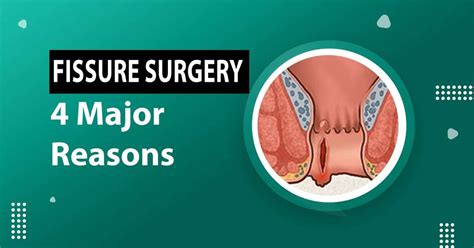
Some of the types of surgery for anal fissures include:
- Lateral internal sphincterotomy: This involves making a small cut in the internal anal sphincter to reduce spasm and promote healing.
- Fissurectomy: This involves removing the fissure and any scar tissue.
- Advancement flap: This involves moving a flap of skin over the fissure to promote healing.
What is an anal fissure?
+An anal fissure is a small tear in the lining of the anus, which can cause severe pain and bleeding during and after bowel movements.
What are the symptoms of an anal fissure?
+The symptoms of an anal fissure include severe pain during and after bowel movements, bleeding, swelling in the anal area, itching, discharge, and difficulty passing stools.
How is an anal fissure treated?
+Anal fissures can be treated with home remedies, such as increasing fiber intake and drinking plenty of water, or with medical treatment, such as topical creams, prescription medications, or surgery.
Can anal fissures be prevented?
+Yes, anal fissures can be prevented by eating a high-fiber diet, drinking plenty of water, avoiding straining during bowel movements, and practicing good anal hygiene.
What are the complications of an anal fissure?
+If left untreated, anal fissures can lead to complications, such as chronic pain, infection, abscess, fistula, and anal stenosis.
We hope this article has provided you with a comprehensive understanding of anal fissures, including their causes, symptoms, treatment options, and prevention strategies. If you have any further questions or concerns, please do not hesitate to comment below or share this article with others who may benefit from this information. Remember to always prioritize your anal health and seek medical attention if you experience any symptoms of an anal fissure. By taking proactive steps to manage and prevent anal fissures, you can reduce your risk of developing this painful condition and maintain good overall health.
